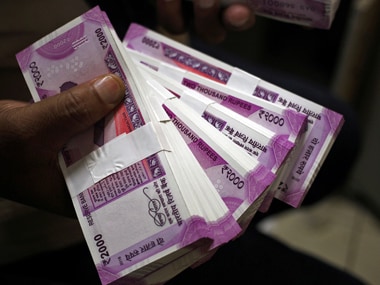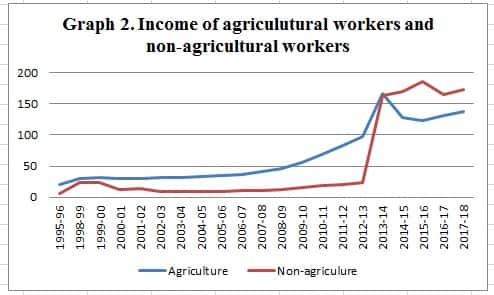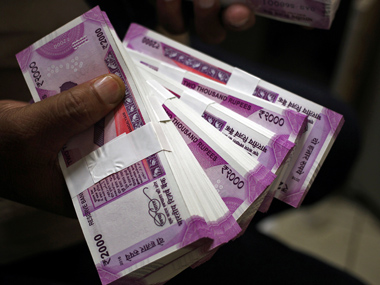Congress Party president Rahul Gandhi proposed a minimum income guarantee to the poor if the party comes to power in the 2019 election. The announcement attracts public attention and there has been media discussion on it. However, the action plan is not yet revealed by the Congress Party. The BJP government at the Centre has also offered Rs 6,000 per annum (Rs 17 per day) to marginal and subsistence farmers. It has also offered a contributory pension scheme called ‘Pradhan Mantri Shram-Yogi Maandhan’ for the unorganised sector workers. As per the Budget 2019 document, this pension scheme shall provide them an assured monthly pension of Rs 3,000 from the age of 60 years on a monthly contribution of a small, affordable amount during their working age. An unorganised sector worker joining pension yojana at the age of 29 years will have to contribute only Rs 100 per month till the age of 60 years. So, this scheme can be called a demand-driven programme, i.e., those who wish and are capable of contributing can join in this programme. These are targeted intervention programmes and do not offer any major change in the household economy of the poor. However, both the Congress and the BJP equally project it is going to change the electoral politics and also improve the economic conditions of the poor. Such self-proclaimed consensus building is the biggest impediment to development in the country. However, the feasibility of the projects is sketchy and will be inadequate for the poor. These declarations should be treated as art of winning elections rather than welfare, and the ‘brilliant’ politicians know that income and employment security attract public imagination in the country more than anything else. [caption id=“attachment_6013191” align=“alignleft” width=“380”]
 Representational image. Reuters[/caption] The minimum income proposed by Congress and the bare minimum support to farmers (Rs 17 per day) by the ruling BJP government are actually rooted in the idea of basic need approach (BNA) proposed by the International Labor Organization (ILO) in 1979. So, these are not new and there have been many trial and errors on this idea. In mid-1970, the International Labour Organisation (ILO) as part of the World Employment Conference proposed the idea of basic need support for workers. It traces back to the paper written by Albert Maslow in the Psychological Review in March 1942 in which he explained the importance of five needs starting with physiological and ending with self-actualization. Also, in the 1950s, the concept of “minimum needs” was developed by Pitambar Pant of the Indian Planning Commission which emphases income support to weaker sections. What ILO proposes is a basic minimum social security to workers rather than income. Though it seems progressive, still it had many contradictions, especially fixing the limit to which basic needs can be offered in a developing economy like India. No developing country could purse it and demonstrate any success. Later on, charity and philanthropic aid agencies took it forward in their humanitarian intervention project and no formal development programme came along with the BNA. The implementation of any basic income or bare minimum economic support is possible only through the informal sector participation. The government has to promote informal sector for such income support programmes. It would be an extension of informalisation of labour and the labour market. In India, nearly 83 percent of the workforce is engaged in the informal sector. Social security to informal sector workers is still an incomplete project. So, in India, the basic need support project does mean heavily depending on the informal sector with a fluctuating wage rate. (See table 1) The Indian informal sector operations are largely driven by independent initiatives and it is fluctuating in itself. Any attempt to enhance income will have two options—first, employment generation in the informal sector or direct cash support to needy. The second option is unrealistic and it is simply not possible in a country like India, i.e.; universal pension schemes, so the option left is to depend on the informal labour market. The rural-urban divide is also shrinking with reference to the informal sector and also there has to be specific-sectoral approach to informal sector. The classical definition of informal sector hardly fits into Indian reality. India’s informal sector is highly scattered and still offers bare minmum livelihood to millions of poor. Graph 1 shows the sectoral contribution of non-agricultural informal sector work in the country. Trading and other services are offering more opportunities other than the manufacturing sector, and hence the approach should be sectoral-specific. Interestingly, both Congress and the BJP keep silent on agricultural sector-focused income generation. Though the government and political parties deny, agriculture still offers income opportunities to millions in the rural area than other informal sector. The daily income difference between agricultural sector and other informal sector proves that Indian political parties neglect agriculture a lot. The daily income of agriculture sector declines after 2013-14, yet agriculture offers opportunities of the rural work force. See graph 2.
 Any effective income support programme in this country should start from agriculture rather than the general informal labour market since agriculture never displaces labour. It may disguise unemployment and still it accommodates poor as labour. The inception of the National Rural Employment Guarantee Scheme (NREGA) changes the informal sector and it gives a formal sector character to the workers. NREGA helped the political parties to intervene in the rural labour without making any promise of permanent employment. It’s true to state that it helped legitimise the informal labour market, and also make local self-government at the grass root level to depend on the informal labour market to promote NREGA. So, the proposed income support programme by Congress hardly move beyond NREGA schemes and, there is likelihood of ending these scheme as another bare minimum welfare programme i.e minimum wage and minimum working days at the rural areas. If the Congress is serious about welfare, the party should think of required minimum social security rather than minimum wage. The last five years of BJP rule proves that they never wanted to break the conventional art of governing voters. It is wrong to expect more from them and this is the dilemma of Indian political systems, which empower the parties to decide the destiny of the poor and needy. (The writer is Assistant Professor, Jamsetji Tata School of Disaster Studies, Tata Institute of Social Sciences)
Any effective income support programme in this country should start from agriculture rather than the general informal labour market since agriculture never displaces labour. It may disguise unemployment and still it accommodates poor as labour. The inception of the National Rural Employment Guarantee Scheme (NREGA) changes the informal sector and it gives a formal sector character to the workers. NREGA helped the political parties to intervene in the rural labour without making any promise of permanent employment. It’s true to state that it helped legitimise the informal labour market, and also make local self-government at the grass root level to depend on the informal labour market to promote NREGA. So, the proposed income support programme by Congress hardly move beyond NREGA schemes and, there is likelihood of ending these scheme as another bare minimum welfare programme i.e minimum wage and minimum working days at the rural areas. If the Congress is serious about welfare, the party should think of required minimum social security rather than minimum wage. The last five years of BJP rule proves that they never wanted to break the conventional art of governing voters. It is wrong to expect more from them and this is the dilemma of Indian political systems, which empower the parties to decide the destiny of the poor and needy. (The writer is Assistant Professor, Jamsetji Tata School of Disaster Studies, Tata Institute of Social Sciences)
The implementation of any basic income or bare minimum economic support is possible only through the informal sector participation
Advertisement
End of Article


)

)
)
)
)
)
)
)
)



